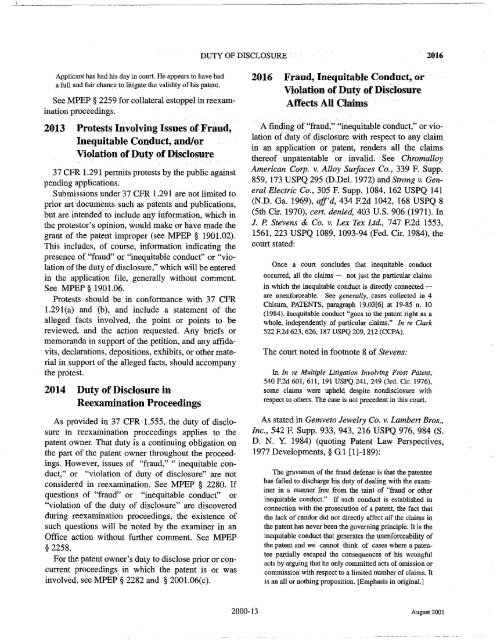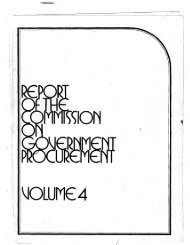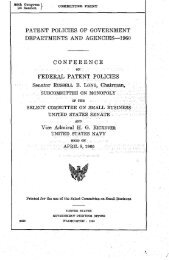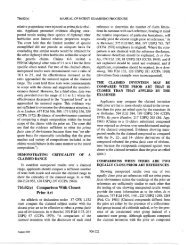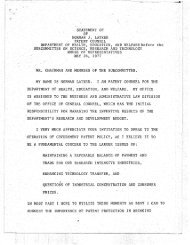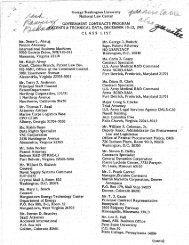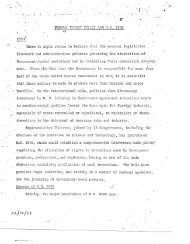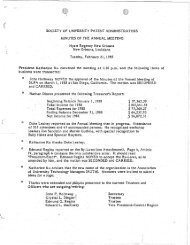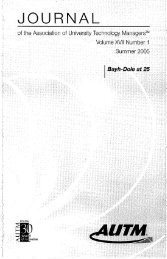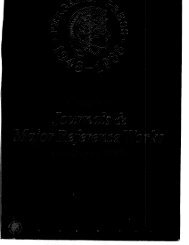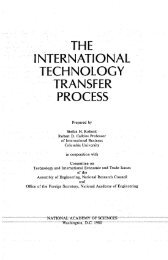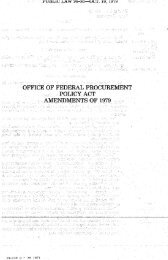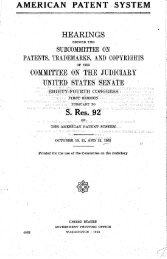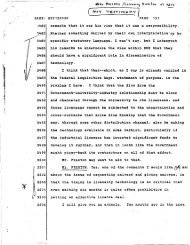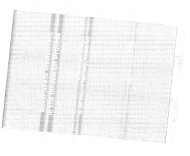The Subject Patent Already Has Underlining or ... - Bayhdolecentral
The Subject Patent Already Has Underlining or ... - Bayhdolecentral
The Subject Patent Already Has Underlining or ... - Bayhdolecentral
Create successful ePaper yourself
Turn your PDF publications into a flip-book with our unique Google optimized e-Paper software.
Applicant has hadhis day in court. He appears to have had<br />
a full and fairchance to litigate thevalidity of his patent.<br />
See KiPEP § 2259 f<strong>or</strong> collateral estoppel in reexamination<br />
proceedings.<br />
2013 Protests Involving Issues of Fraud,<br />
Inequitable Conduct, and/<strong>or</strong><br />
Violation of Duty of Disclosure<br />
37 CFR 1.291 permits protests by the public against<br />
pending applications.<br />
Submissions nnder 37 CFR 1.291 are not limited to<br />
pri<strong>or</strong> art documents such as patents and publications,<br />
but are intended to include any inf<strong>or</strong>mation, which in<br />
the protest<strong>or</strong>'s opinion, would make <strong>or</strong> have made the<br />
grant of the patent improper (see MPEP § 1901.02).<br />
This includes, of course, inf<strong>or</strong>mation indicating the<br />
presence of "fraud" <strong>or</strong> "inequitable conduct" <strong>or</strong> "violation<br />
of the duty of disclosure," which will be entered<br />
in the application file, generally without comment.<br />
See MPEP § 1901.06.<br />
Protests should be in conf<strong>or</strong>mance with 37 CFR<br />
1.291(a) and (b), and include a statement of the<br />
alleged facts involved, the point <strong>or</strong> points to be<br />
reviewed, and the action requested. Any briefs <strong>or</strong><br />
mem<strong>or</strong>anda in supp<strong>or</strong>t of the petition, and any affidavits,<br />
declarations, depositions, exhibits, <strong>or</strong> other material<br />
in supp<strong>or</strong>t of the alleged facts, should accompany<br />
the protest.<br />
2014 Duty of Disclosure in<br />
Reexamination Proceedings<br />
As provided in 37 CFR 1.555, the duty of disclosure<br />
in reexamination proceedings applies to the<br />
patent owner. That duty is a continuing obligation on<br />
the part of the patent owner throughout the proceedings.<br />
However, issues of "fraud,"" inequitable conduct,"<br />
<strong>or</strong> "violation of duty of disclosure" are not<br />
considered in reexamination. See MPEP § 2280. If<br />
questions of "fraud" <strong>or</strong> "inequitable conduct" <strong>or</strong><br />
"violation of the duty of disclosure" are discovered<br />
during reexamination proceedings, the existence of<br />
such questions will be noted by the examiner in an<br />
Office action without further comment. See MPEP<br />
§ 2258.<br />
F<strong>or</strong> the patent owner's duty to disclose pri<strong>or</strong> <strong>or</strong> concurrent<br />
proceedings in which the patent is <strong>or</strong> was<br />
involved, see MPEP § 2282 and § 2001.06(c).<br />
DUTY OF DISCLOSURE . 2016<br />
2016 Fraud, Inequitable Conduct, <strong>or</strong><br />
Violation of Duty of Disclosure<br />
Affects All Claims<br />
A finding of"fraud," "inequitable conduct," <strong>or</strong> violation<br />
ofduty of disclosure with respect.to any claim<br />
in an application <strong>or</strong> patent, renders all the claims<br />
thereof unpatentable <strong>or</strong> invalid. See Chromalloy<br />
American C<strong>or</strong>p. v. Alloy Surfaces Co., 339 F. Supp.<br />
859, 173 USPQ 295 (D.De!. 1972) and Strong v. General<br />
Electric Co., 305 F. Supp. 1084, 162 USPQ 141<br />
(N.D. Ga. 1969), aff'd, 434 F.2d 1042, 168 USPQ 8<br />
(5th Cir. 1970), cert. denied, 403 U.S. 906 (1971). In<br />
J. P. Stevens & Co. v. Lex Tex Ltd., 747 F.2d 1553,<br />
1561, 223 USPQ 1089, 1093-94 (Fed. Cir. 1984), the<br />
court stated:<br />
Once a court concludes that inequitable conduct<br />
occurred, all the claims - not just the particular claims<br />
in which the inequitable conduct is directly connected <br />
are unenf<strong>or</strong>ceable. See generally, cases collected in 4<br />
Chisum, PATENTS, paragraph 19.03[6] at 19-85 n. 10<br />
(1984). Inequitable conduct "goes to the patent right as a<br />
whole, independently of particular claims." In re Clark<br />
522 F.2d 623, 626, 187 USPQ 209, 212 (CCPA).<br />
<strong>The</strong> court noted in footnote 8 of Stevens:<br />
In In re Multiple Litigation Involving Frost <strong>Patent</strong>,<br />
540 F.2d 601, 611, 191 USPQ 241, 249 (3rd. Cir. 1976),<br />
some claims were upheld despite nondisclosure with<br />
respect to others. <strong>The</strong>case is notprecedent in thiscourt.<br />
As stated in Gemveto Jewelry Co. v. Lambert Bros.,<br />
Inc., 542 F. Supp. 933, 943, 216 USPQ 976, 984 (S.<br />
D. N. Y. 1984) (quoting <strong>Patent</strong> Law Perspectives,<br />
1977 Developments, § G1 [1]-189):<br />
<strong>The</strong> gravamen of thefraud defense is that thepatentee<br />
has failedto discharge his dutyof dealing withthe examiner<br />
in a manner free from the taint of "fraud <strong>or</strong> other<br />
inequitable conduct." If such conduct is established in<br />
connection with the prosecution of a patent, the fact that<br />
the lack of cand<strong>or</strong> did not directly affectall the claimsin<br />
thepatent hasneverbeenthegoverning principle. It is the<br />
inequitable conduct that generates thennenf<strong>or</strong>ceability of<br />
thepatent and we cannot think of cases where a patentee<br />
partially escaped the consequences of his wrongful<br />
actsby arguing that he onlycommitted actsof omission<strong>or</strong><br />
commission withrespect to a limitednumber of claims.It<br />
is anall <strong>or</strong>nothing proposition. [Emphasis in <strong>or</strong>iginal.]<br />
2000-13 August 2001


